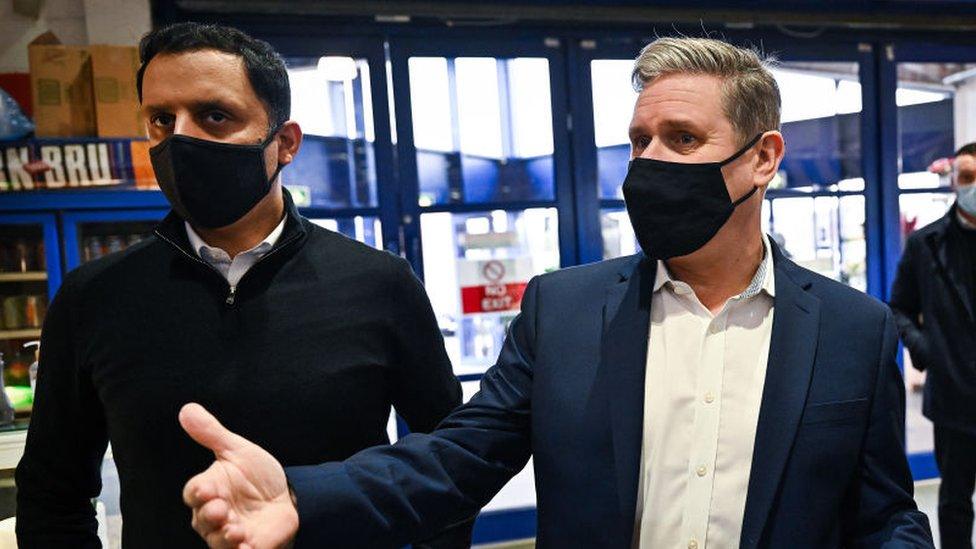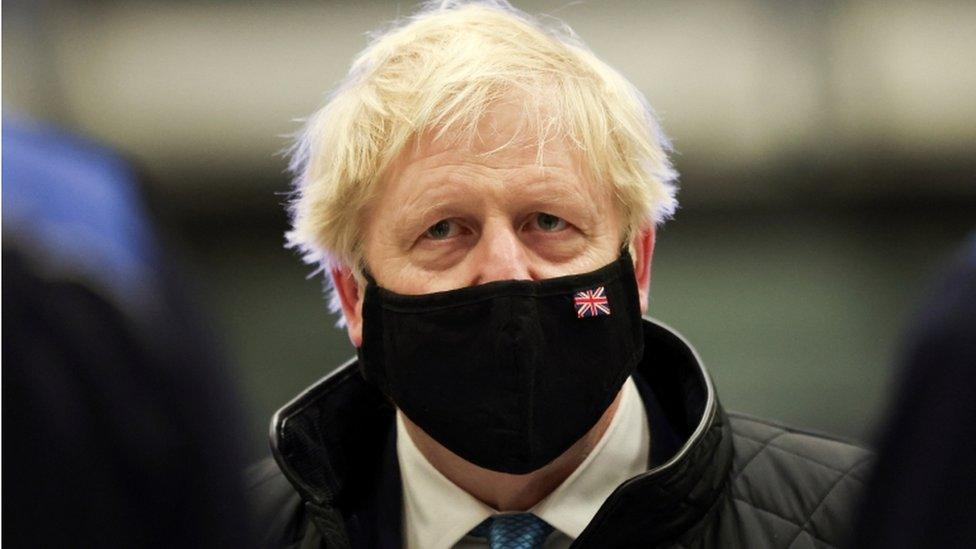Keir Starmer says Boris Johnson 'undermining the case for the Union'
- Published

Sir Keir was speaking during a visit to a market in Glasgow with Scottish Labour leader Anas Sarwar
Boris Johnson is endangering the union between Scotland and England by refusing to resign over Downing Street parties, the Labour leader has claimed.
Sir Keir Starmer accused the Tories of having "disdain" for Scotland.
And he said that the longer the prime minister remains in office, "the more danger there is to the Union".
He was speaking amid further confusion over when Sue Gray's report into lockdown parties in Downing Street will be published.
The report was due to be sent to Downing Street this week - but the Met Police said on Friday it has asked for "minimal reference" in the report to events they are investigating to avoid prejudicing its own inquiries.
It is now unclear what the police investigation means for the timing of the report, how much detail will be included or whether it will now be published at all.
Mr Johnson's spokesman has said the prime minister does not believe he broke any Covid lockdown rules, with the PM having previously pledged to publish Ms Gray's report in full - although he did not say when that was expected to happen.
Some within his own party - including Scottish Conservative leader Douglas Ross - have already joined opposition parties in calling for him to quit ahead of the report being published.
Many other Conservative MPs have said they will wait for the report's findings before deciding whether to submit letters of no confidence in the prime minister
First Minister Nicola Sturgeon tweeted that the situation was now creating the suspicion - "however unfairly" - that the inquiry process was "aiding Johnson at the expense of public accountability".
Allow X content?
This article contains content provided by X. We ask for your permission before anything is loaded, as they may be using cookies and other technologies. You may want to read X’s cookie policy, external and privacy policy, external before accepting. To view this content choose ‘accept and continue’.
Speaking during a visit to Glasgow on Friday morning, Sir Keir said he believed that the "squabbling" within the Conservative Party was "undermining the case for the Union".
He said: "I think the more that anybody sees of Boris Johnson, the more they are frustrated at the fact that through his misbehaviour we now have a civil service investigation and a criminal investigation into our prime minister and into what went on in Downing Street.
"That means that the whole of government is paralysed and not focused on the things that I think in Scotland matter most.
"People here have talked to me about the cost of living, about the the price hikes that they've got, energy price hikes, their bills are going up.
"They're really worried about inflation and they know that the government is about to whack them for more tax - the focus is completely in the wrong place because of the wrongdoing of the prime minister."
Sir Keir said that Labour wanted to "unite people with a better plan going forward" after the pandemic rather than "reopening the old arguments about division".
He added: "That is a very powerful case for Scotland, and it is a very powerful case for the Union."


It is the independence supporting parties - principally the SNP and the Greens - that are explicitly committed to ending the union.
By contrast, Boris Johnson - as self-styled minister for the union and leader of the Conservative and unionist party - is supposed to be its defender-in-chief.
His supporters argue that his firm stance against indyref2 and his plans for direct spending in Scotland as part of the so-called "levelling-up" agenda demonstrate his commitment.
But Labour has repeatedly argued that Mr Johnson - who is particularly unpopular in Scotland - is the "single biggest threat to the future of the UK".
They say his description of devolution as a "disaster", new powers in the internal market act to override devolved decisions and his handling of the pandemic have undermined the fabric of the union.
During his premiership, there was a sustained period where opinion polls recorded majority support for Scotland leaving the UK.
But that trend has since been broken and it's not yet clear what impact the huge controversy over lockdown parties might have on attitudes to independence.

The Labour leader also dismissed suggestions that his party was more focused on winning back seats in England it has lost to the Conservatives than it is winning back seats in Scotland from the SNP.
Labour does not currently appear to be enjoying a similar boost in the polls north of the border as it it elsewhere in the UK.
And there have been suggestions that the controversy over the Downing Street parties could play into the hands of Ms Sturgeon's SNP in Scotland rather than Anas Sarwar's Scottish Labour.

Boris Johnson has said he dies not believe he broke lockdown rules
The first minister appears to be preparing to ramp up her push for a second independence referendum, with a freedom of information request revealing earlier this week that the Scottish government currently has 11 civil servants, external working on a fresh prospectus for leaving the UK.
Ms Sturgeon said she would do "everything that is within my power" to ensure there is a vote on independence next year.
She has said she will "set out exactly what that means in terms of the date of the introduction of legislation when we've taken the detailed decisions around that".
However, the UK government has shown no sign of being willing to grant formal consent for a referendum, and it is unclear what Ms Sturgeon's strategy would be if this continues to be the case.
Scottish Conservative constitution spokesman Donald Cameron said it was "outrageous that the SNP government are devoting huge resources to their push for another divisive independence referendum, when all their focus should be on Scotland's pandemic recovery."